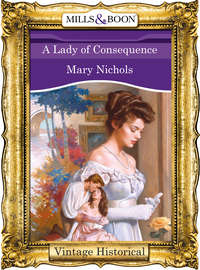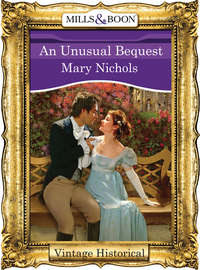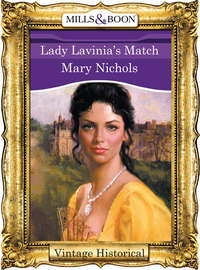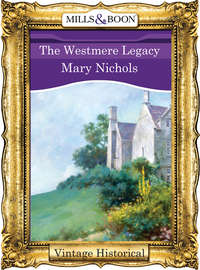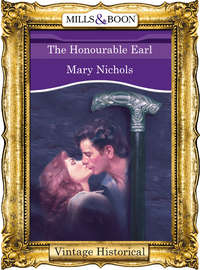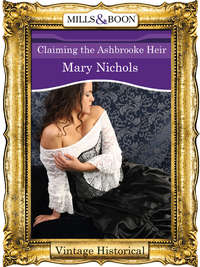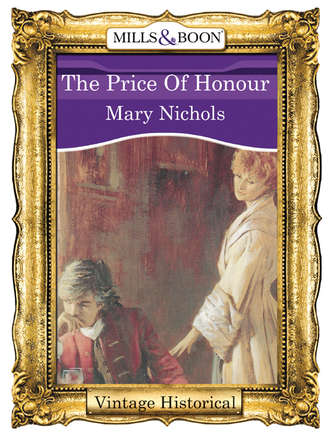
Полная версия
The Price Of Honour
In no time she had a fire lit in the kitchen stove and set a cauldron of water on it. Hungry as she was, a bath came before food. She dragged the bath down the stairs and set it before the kitchen fire, then went out to gather the cabbage leaves. By the time she had sliced the onions, set them on to boil and shredded the cabbage finely, the water in the pan was hot enough to add to the cold water she had already poured into the tub. She smiled to herself as she threw off her clothes and climbed into it. Once upon a time she had had a maid to fill her bath, help her dress and see to her hair. Her clothes had been clean and pressed and were always ready to put on. As soon as the slightest sign of wear or a tear had appeared, they had been discarded. She looked across at the peasant skirt and blouse she had been wearing for weeks and smiled; they were fit for nothing but the bonfire.
She slid down among the soap bubbles and imagined herself back at home. Her bath would be in her bedroom, where a fire would be blazing and all her clean clothes laid out on the bed. Jane would be fussing round her, soaping her back and helping to wash her red-gold hair. It had been long in those days but that had become impractical while she was following the colours, not only because she had no one to dress it for her, but because of the difficulty of keeping it clean and free from vermin. She had cut it very short and been surprised when it sprang into curls all over her head. She soaped it now and ducked beneath the water to rinse it, then came up laughing.
She was free! Gloriously and happily free! She felt no guilt because she had always done her very best for both Tom and Philippe, sharing the hardships of the march, scavenging for food, cooking in almost impossible conditions, cleaning their uniforms and even, on occasion, carrying their packs, when they were utterly exhausted. She had taken both for better or worse and now it was all over. Over!
Never again! She had had her fill of marriage. From now on she would keep her independence. She still had to find her way back to England, still had to face up to her father, but that was nothing compared with what she had endured in the last two years. Two years. Two years wasted. No, she decided, not entirely wasted; she had learned a great deal about herself, not all of it good, but she had emerged, she hoped, a little wiser. She began to sing as she soaped herself and the bath filled with bubbles.
‘The noble Duke of York,
He had ten thousand men,
He marched them up to the top of the hill,
And he marched them down again.’
‘Madame is in good spirits,’ said a voice in English.
She froze. Slowly she reached out for a towel and held it to cover her breasts, then turned her head towards the door. The man who had come in from the rain and was standing on the doormat knocking the water from his shako was the rider she had seen earlier. He was carrying a rifle and a dead hare. Was this his home? Was she the intruder or was he? She decided to attack first.
‘Is it not the custom where you come from to knock before entering?’
‘I did. You were making so much noise you did not hear.’
‘Noise, sir?’ She dared not move for fear of disturbing the bubbles which enveloped her. ‘Some have said I have a passably good voice.’
He smiled and walked over to the stove to sniff appreciatively at the pot; it brought him round to her front. ‘Is your mistress at home?’
‘My mistress?’ she repeated, then, realising he thought she was a servant, laughed. ‘I call no one mistress.’
‘You are surely not the lady of the house?’
‘No. I have never met her.’
He laughed aloud. ‘Oh, I see. An opportunist like myself. Are you alone?’
She hesitated, but there was no point in denying it; he would soon discover the truth. ‘Yes.’
He indicated the pot with a jerk of his head. ‘That smells good.’
‘The least a gentleman would do is leave a lady to finish her toilette in privacy.’
‘But I am no gentleman.’ There was a hint of bitterness in his voice which made her look up into his face. There were tiny lines etched around his eyes which could have been laughter-lines but could equally have been caused by long hours squinting into the sun. His mouth was firm and his teeth were strong and white; a handsome man, she decided, but refreshingly unaware of it.
‘No, that much is evident,’ she said crisply, and when he made no move to go picked up the bar of soap and hurled it at him. Her aim was good and it struck him on the side of the head, bounced off his shoulder and slithered to the floor. ‘Get out!’ she yelled.
He laughed and retrieved it, weighing it in his hand as if considering whether to throw it back. ‘Out?’ he asked mildly, appraising what he could see of her — a mane of red-gold hair, which lay against freckled cheeks in wet tendrils, a long neck and sloping white shoulders which disappeared behind the towel she was holding against herself. The vision was spoiled to some extent by hardened brown hands which were obviously accustomed to work. ‘But it is pouring with rain. And besides, I am hungry. Now if you were to share the pot with me I could provide something to improve its flavour.’ He waved the hare at her.
‘Go away and leave me in peace. I do not want or need your company.’ There was nothing else at hand to throw except the towel and she was loath to let go of that, and he showed no sign of doing as she asked. With nothing in her hand to defend herself, she was obliged to change her belligerent attitude to one of reasonableness; and the idea of meat made the saliva run in her mouth. ‘Can’t you see I am in no position to do anything about the soup or the meat with you hovering over me? And this water is becoming cold and I want to dress.’
He grinned. ‘I could do with a bath too. How about sharing it with me?’
‘If you go and leave me to dress, I will cook the hare and heat up some more water for you.’
‘That sounds like a fair bargain to me.’ He paused and pointed to the door into the rest of the house. ‘Have you been through there?’
‘Yes. It is empty, nothing to steal, I am afraid.’
‘What a disappointment for you.’
She was about to say she was referring to him and that she was not a thief when she remembered the clothes she had found and intended to keep. Instead she said, ‘Go and wait in the hall if you want any dinner.’
He made an ostentatious leg and left the room. As soon as she was sure he had really gone, she scrambled out and dried herself quickly, then dressed in her own underclothes and topped them with the dressing-gown she had found. She went to the door and called to him. ‘If you want a bath, you had better empty this one and draw more water.’
She went to stir the pot and skin the hare and did not know he had come back into the room until he spoke. ‘Where is the owner of this?’
She turned towards him. He was standing just inside the door holding Philippe’s coat at arm’s length. ‘Dead,’ she said flatly, returning to her task.
‘Who was he?’
‘My husband.’
‘Your husband?’
‘Yes. Lieutenant Philippe Santerre.’
‘A Frenchman?’
‘Yes.’ She looked at him boldly. ‘Does that change your mind?’
‘About what?’
‘About sharing a meal.’
‘No, why should it?’ He began dragging the bath towards the door. She watched as he opened the door, tipped it up and emptied its contents into the yard where the soapy bubbles dispersed in the puddles already there. He brought it back and stood it on end against the wall. ‘Is there anyone in the house at all?’
‘No. Unless they are hiding in a cupboard. There is a cellar, but the door is locked, I couldn’t open it.’
‘Best be sure.’ He picked up his rifle and left her. She could hear him moving about the house, doing as she had done earlier and searching every cranny. She was stirring the pot and humming quietly to herself when she was startled by a shot. She ran into the hall, half expecting to see him lying dead at the feet of the rightful owner of the house, but there was no one about and all was quiet. A moment later he appeared clutching two bottles of wine. ‘Had to shoot the lock off,’ he said. ‘But there was no one there. They probably evacuated when they heard your people were advancing.’
‘My people?’
‘Johnny Bluecoats.’
‘They are not my people.’
‘One of them was. You said so.’
‘I am English, just as you are.’
‘Ah.’ He smiled wryly, taking the bottles into the kitchen and setting them on the table. ‘How can you be sure that I am?’
‘You are dressed in a British uniform and you speak English as well as I do.’
‘Neither of which is proof positive. No, if I were you, I would want to know a great deal more than that.’
‘Why? It is of little consequence; our paths are unlikely to cross again.’
‘Now that would be a pity,’ he said. ‘I thought my luck had changed at last.’
‘You are impertinent, sir.’
He stood squarely and gave her a cool look of appraisal from her bare feet — army boots were hardly a suitable accessory for a blue silk dressing-gown — up over her five feet seven — she had the figure of an angel, he decided — to an oval face in which the green eyes flashed at him with a confusing mixture of humour and anger. He laughed. ‘Pretending to be affronted by what was, after all, meant as a compliment, doesn’t fool me, Madame Santerre. You are no drawing-room miss and, I’ll wager, never have been. A camp follower, that’s what you are, and, it seems, not particular as to the camp. Tell me, is it true that Frenchman are more romantically inclined than Englishmen?’
She picked up the kitchen knife she had used to cut up the hare and raised it as if she meant to throw it but, deciding that it would be very unwise and probably dangerous, she turned back to her cooking. ‘Are you going to bath before we eat or afterwards? The water is hardly hot yet.’
‘It will do me. I’ll take it upstairs.’ He picked up the cauldron of hot water with little effort, though it was extremely heavy, grabbed the handle of the bath and disappeared with them into the hall, carrying the one and dragging the other.
She went to the door and shouted after him, ‘Not the room with the four-poster. I saw it first.’
Half an hour later he returned, looking much more presentable, though he had been obliged to put the buttonless uniform on again. ‘There are no men’s clothes at all,’ he said. ‘Perhaps the owner was a lady who lived alone. It would account for her leaving in the face of an army, don’t you think?’
‘Perhaps.’ She filled two bowls to the brim with the hot stew and set them on the table, together with cutlery and glasses which she had found in the back of a kitchen cupboard. They were obviously not the family silver; that had gone, either with its owner or, after her departure, to marauding soldiers. ‘Would you like me to sew your buttons back on?’
‘No.’ He spoked sharply. ‘I like things as they are.’
‘Do you? How whimsical.’ She sat down opposite him and picked up her spoon. ‘I should have thought you would be glad to be able to close your coat again. The wind and rain in the mountains are cold, even in summer.’
‘I do not feel the cold.’
‘No? Not outside perhaps, but inside?’ She did not know why she said that, except that he looked like a man who kept his inner self very much to himself.
‘What do you mean?’
She answered his question with another. ‘Why are you alone, so far from the British lines?’
‘Why should the British lines be of interest to me? I told you, you should not make assumptions from appearances.’
‘Are you saying you are not an English soldier?’
‘I am not.’
‘But you were?’
‘That is neither here nor there.’
She guessed that he had been cashiered and it made her curious. In times of war when every available soldier was needed they would not discharge a man unless there was a very compelling reason. What crime had he committed? Ought she to be afraid of him? She supposed if she persisted in asking questions he might become dangerous, but at the moment he seemed more concerned with tucking into his dinner; he was obviously not going to be drawn on the subject. ‘No,’ she agreed. ‘It is no concern of mine. I only asked because I want to go back to the British lines myself and I thought you might take me with you.’
‘No!’ It was almost a shout. ‘My business is not in that direction at all. Now, if you don’t mind, we will change the subject.’ He lowered his voice and smiled. ‘Now, tell me how you came to be out on the mountain alone. It was you I saw earlier on the road, was it not?’
‘Yes, but I did not think you had noticed me, you seemed so preoccupied.’
‘I have been trained to notice things, but I must admit the filthy peasant I saw on the road bears very little resemblance to the beautiful young lady I found naked in a bath. If it had not been for the uniform coat, I might not have been so quick to realise they were one and the same.’
‘Careless of me,’ she said. ‘I suppose if I want to get back to the British lines I had better dispose of it.’
‘Why were you wearing it?’
‘It is warmer than nothing and nights on the mountains can be cold.’ She paused to sip her wine; it was a full-bodied red and made her feel sensuous and relaxed. She ought to beware of it. ‘Why are you still wearing yours?’
He gave a cracked laugh. ‘As you say, it is warmer than nothing.’
‘We could exchange them. I’ll have yours and you have mine.’
His head snapped up and he looked at her angrily. ‘Now why should you imagine that I would lower myself to wear a French uniform? I…’ He stopped suddenly as an idea came to him. ‘Tell me about yourself. Where did you meet your husband?’
‘Philippe, you mean? At Oporto, or more accurately a little to the north; I am not sure exactly where.’
‘Is Oporto your home?’
‘Of course not. I told you, I am English.’
‘There is no “of course” about it. There is quite a colony of English in Oporto, wine merchants most of them. Why do you think the government at home was so anxious to free it? Port is one of their favourite drinks.’
‘How cynical you are.’
‘Perhaps I have reason to be.’ He paused. ‘Tell me about Philippe.’
‘Why should I?’
‘I am interested and it will while away the evening.’ He leaned forward. ‘Unless you can think of something more exciting to do?’
The implication was clear and it infuriated her. ‘You do not have to spend the evening with me at all. You will find what you want in the village, I have no doubt.’
‘What I want? How can you know what I want? You do not know me.’
‘No. You have not even troubled to introduce yourself. Perhaps you are ashamed to do so.’
‘You want my name? Of what importance is that? It might just as well be Philippe Santerre.’
‘Philippe was an honourable man.’
‘You think I am not?’ He picked up his glass and drained it quickly, then refilled it. ‘You may well be right, Madame Santerre, for who decides such things — a man’s friends or his enemies…?’
‘You are talking in riddles.’
‘My apologies, ma’am.’ He inclined his head and then lapsed into silence.
She watched him for a moment or two then stood up to clear the table. ‘What are you going to do now? Get drunk?’
He laughed. ‘It would take more than a couple of bottles of red wine to do that. Besides, I need a clear head.’ He caught her hand as she passed him. ‘Sit down and tell me about yourself.’
‘It is a very long story.’
‘But a fascinating one, I am sure. You speak like a lady, look like a tramp and behave like a hoyden, so how can I be other than intrigued?’
She laughed and sat down again. ‘My aunt always said Papa had brought me up like a boy.’
‘Impossible!’ he said, laughing. ‘You do not look in the least like a boy. In fact…’ he smiled ‘…I could envy Philippe his good fortune.’
‘I shouldn’t do that,’ she said quietly. ‘He was hanged by the guerrilleros.’
‘When?’
‘Yesterday. We were out shooting hares and they captured us.’
‘I am sorry.’
‘I told them I was the wife of an English soldier and Philippe had taken me against my will…’
‘Was that true?’
‘Not exactly.’
‘Tell me exactly.’
‘I was married to an English soldier, but he was killed in the chase after the battle for Oporto.’ She did not know why she answered, but it was a relief to have someone to talk to in English, and if he could be made to appreciate her plight he might be prepared to help her.
‘Another husband! How many have you had?’
‘Two.’
‘And still only…how old?’
‘It is no business of yours.’
‘Twenty-two, twenty-three?’ he queried. ‘And already widowed twice?’
‘You are a cynic, aren’t you? Haven’t you ever been in love?’
‘Oh, yes,’ he said, his face twisting in a wry smile. ‘And little good it did me. But go on with your story, we can come to mine later. Presumably you were at the tail of the British advance with the baggage?’
‘I was, until a courier who had come back with dispatches told me Tom had been wounded. Then I left it and went forward to look for him.’
‘As any good wife would do.’
‘As any good wife would do,’ she repeated.
‘You crossed the river?’
‘Yes.’
‘How?’
‘If you are English, you know the whole army crossed in small boats.’ She paused and looked up at him. ‘Or are you testing me?’
He laughed, poured more wine and settled back in his chair. ‘Tell me, did you find him?’
‘Yes, but he died very quickly. I tried to get back but I lost my way and ran into a company of French infantrymen.’
‘And in the blink of an eye you had changed sides and become a French soldier’s wife…’
‘It wasn’t like that at all,’ she protested. ‘You don’t understand. And if that is all you have to say, then I shall leave you and go to bed.’
‘Bed. Now, there’s a thought!’ There was amusement in his voice. ‘Have you a mind to change sides again? I might be able to accommodate you.’
She picked up her glass and threw it at him. It caught his chin and shattered, scattering shards all over his coat, the table and the floor. He calmly stood up and brushed himself down, ignoring the tiny trickle of blood on his chin. ‘I shall take that as a negative answer, which means you are still French, still the enemy…’
‘And who are you to talk?’ she demanded. ‘You are not so lily-white yourself, are you? Unless I miss my guess, you are in disgrace, so what right have you to censure me? I am going to bed. And I mean to barricade the door. And I shall be obliged if you have taken yourself off before I come down in the morning.’
He reached out to catch her wrist. She tried to pull herself out of his grasp, but the more she struggled, the tighter he gripped her. She circled round, pulling him round with her, so that she could reach the rifle he had left leaning against the wall. With all the strength she could muster, she twisted herself free and grabbed the weapon. ‘Now!’ she said, pointing it at him. ‘Do not think I don’t know how to use this because I promise you I do.’
He laughed and put up both hands in surrender. ‘Lord preserve me from a gun in the hands of a woman! You may rest easy, madame, I was only going to suggest a truce. We could help each other.’
‘How?’ she asked warily, still aiming the gun.
‘You want to go back to the British lines, do you not?’
‘Yes. Will you take me?’
‘Perhaps. If you do something for me first.’
‘It depends.’
‘You take me to Ciudad Rodrigo and get me through the French lines and later I will take you home — all the way to England, if you like.’
She lowered the gun to look at him, dumbfounded. ‘You are mad,’ she said at last. ‘They’ll kill you.’
‘Not if you vouch for me.’
‘Vouch for you!’ Her voice was almost a squeak. ‘I can hardly vouch for myself. They do not know me. Philippe and I had only just arrived when the town was taken. We had spent the winter in France while Philippe’s wounds healed and were joining a new regiment…’
‘You mean that no one in the town knew Philippe either?’
‘I don’t think so.’
‘Better and better,’ he said. ‘I shall be Lieutenant Philippe Santerre.’
‘For heaven’s sake, why? Are you tired of living?’
He laughed, but the sound was not a cheerful one. ‘Perhaps.’
‘What happened to make you so bitter?’
‘That is my business. Now, will you take me back to Ciudad Rodrigo or not?’
‘Can you speak French like a native?’
‘No, but I can understand it well enough, and, remember, I have just been hanged and my throat is sore. Why did they hang him, by the way? Why not just shoot him, so much quicker and cleaner?’
She shrugged. ‘A rope is cheaper than a bullet and, besides, a shot echoes a long way in these mountains; I suspect they did not want their hide-out found.’
‘One man’s bad fortune is another’s luck. I think my voice has been permanently affected by the ordeal.’
‘You will never get away with it.’
‘I will if you stay with me to be my guide and do the talking.’
‘You must be crazy if you think I would agree to that.’ She looked hard at him, trying to make up her mind if he was making some macabre joke at her expense, but his expression was perfectly serious and the light in his hazel eyes was not one of levity. He looked deadly serious, almost as if he was pleading with her. ‘Why do you want to do this? Do you want to change sides? If so, there are easier ways of doing it; you could simply say you had deserted — some do, you know.’
‘I could do that, of course, but this way seems the more interesting prospect, certainly more exciting than being a prisoner of war.’
‘And if I refuse?’
‘I’ll do it anyway.’
‘Then you will die in the attempt.’
He shrugged. ‘Then so be it.’
He sat down at the table again with an empty glass in front of him and stared out of the window into the darkness beyond it, as if he could see something, or someone, who haunted his thoughts and dictated his actions. For a brief moment she felt sorry for him, and reached out to lay a hand on his arm. ‘Sleep on it,’ he said, without turning towards her. ‘Sleep on it. I shall not disturb you.’
She left him reaching for the bottle to refill his glass and made her way up to the huge four-poster. It was all part of a macabre dream; he did not exist, the guerrilleros did not exist, Philippe had not been hanged. She was in bed at home and soon Jane would wake her with her breakfast on a tray. Home! How badly did she want to go home? How much was she prepared to pay for it?
CHAPTER TWO
OLIVIA was awoken before dawn by the sound of a horse’s hoofs on the gravel of the drive, and she sprang up to look out of the window. He was riding away in the blustering wind which had followed the rain, walking his horse in the same slow, deliberate way she had seen him riding the day before. Had he had second thoughts about his preposterous idea or had he decided to go alone after all? If that were so, he would never succeed in passing the guard at the gates of Ciudad Rodrigo, let alone impersonating Philippe. It was true he was about the same height and build, and in a poor light his hair might look as dark as Philippe’s, but in the glare of day, in the face of questioning… She shuddered at the risk he would be taking. Even with her it would be bad, but at least she could give him Philippe’s uniform coat and take him to their lodgings where she could hand over her dead husband’s papers and belongings. As long as he did not speak and met no one who had known Philippe, he stood a chance, if only a slim one.
She pulled herself up short. Why should she concern herself with a disgraced English officer? Why should she care what happened to him? And why, in heaven’s name, should she delay her own return to the British lines to help him? She did not even know why he wanted to do it. She laughed suddenly. She did not even know his name. And there were other puzzling things about him — his demeanour, his speech and the way he sat his horse indicated that he had been an officer, but officers did not usually carry rifles. And the Baker rifle he had with him was only issued to the élite Rifle Brigade and their uniform coat was green, not red. Tom had often said that if he had known about the Rifles before he signed on he would have enlisted in the Ninety-fifth. Poor Tom.


